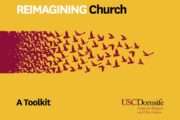Lately the religion blogosphere has been all a twitter about a new book by Rachel Held Evans, who has documented her spiritual and religious path from being a good evangelical millennial to joining the Episcopal Church. Journalists, pundits and some evangelical leaders seem to be looking for the future of evangelical Christianity in Evans’ story, but they should exercise caution in doing so. Evangelical Millennials won’t likely follow her path into a mainline Protestant denomination. Still, her reasons for leaving are representative of broader trends within evangelicalism, although with somewhat different outcomes.
Evans’ account echoes what we have read about younger evangelicals in academic and popular accounts, some of which I have written myself (here and here). Young people are increasingly dissatisfied with being evangelical due to the politicization of evangelical Christianity and to social-moral stances such as opposition to LGBT rights and gay marriage. Evans and other pundits add that many younger evangelicals are tired of the over-produced, franchised form of Christianity that emanates from the Evangelical Religion-Industrial Complex. As I’ve noted elsewhere, this includes not only the many megachurches that all seem cut from the same pattern, but also the publishing houses (including Evans’ publisher), colleges, universities and seminaries that together form the core institutional infrastructure that produces evangelical culture.
The hubbub over what Evans represents is a more recent telling of something we identified more than a decade ago—that some younger evangelicals and Pentecostals were leaving their churches for the history, tradition and embodied experience of Christianity that Catholic, Orthodox and Episcopal Churches provide. As one Episcopal convert from evangelicalism told us then, “The incense, the spoken and sung liturgy, the kneeling, the Eucharist itself, all demanded participation in the beauty of the worship. It was like being in the orchestra instead of watching a performance.”
Evans has gone to great pains to express that theologically she is still essentially an evangelical, holding to what were once called the “fundamentals of the faith.” In this, she is not alone. The individuals we interviewed a dozen years ago didn’t give up their core evangelical commitments. Instead, they saw the liturgical experiences and connection to history and tradition as a more authentic expression of their (evangelical) faith. They became evangelical and evangelistic Episcopalians, Catholics and Orthodox Christians, convinced that they had found the true expression of Christianity—which evangelicalism could never be. Just as Evans is doing now with her book tour, they sought to convince others of the superiority of their newfound spiritual and religious world.
I don’t dispute the reasons for leaving evangelicalism. But the idea suggested by Evans’ account that younger evangelicals are streaming out the back door of their neighborhood megachurch to become members of mainline or Catholic churches is just plain wrong. For a book I’m writing with Melinda Lundquist Denton, we’ve conducted surveys and in-depth interviews of a nationally representative sample of emerging adults over a ten-year period. They were teenagers when we first met them, and they were 23-28 years of age when we completed our fourth and last wave of data collection in the fall of 2013. They represent the heart of the so-called Millennial generation.
Based on our data, evangelical Millennials are decidedly not moving into mainline Protestant or Catholic churches in any significant numbers. Looking at just the young people who identified as evangelical when we first surveyed them as teenagers, only 5 percent moved to mainline Protestant denominations and only 2 percent moved to the Catholic Church. Fully 25 percent of these emerging adults now identify themselves as “not religious” and have few or no ties to any religious group.
Despite this bad news for evangelicals, in a current research project we’re finding there is a vibrant movement of younger evangelicals who are neither leaving religion behind nor converting to liturgical forms of Christianity. Instead, they are forming their own churches. These churches are by any measure fully in line with historic evangelicalism, but are motivated by their members’ desire for smaller congregations focused more explicitly on the spiritual and material needs of their local communities.
Most of these new churches differentiate themselves from their evangelical forebears by committing to being multi-ethnic and multi-class congregations. Some are also committed to being inclusive of the LGBT community. None are particularly interested in politics and culture wars as practiced and sponsored by the Evangelical Religion-Industrial Complex. Instead, any politics they may engage in relates to improving local schools, creating job opportunities, feeding and clothing the hungry and any number of other activities that seem to have been lost to evangelicalism as it has been practiced over the last 40 years.
So what might the future be for millennial evangelicals? I’ve begged off of answering this question in the past, but if I had to predict, I would say that any significant increase in movement from evangelicalism to mainline Protestant, Catholic or Orthodox churches is unlikely. Perhaps, though, these will continue to be a spiritual destination for the evangelical creative class. More likely, some younger evangelicals will continue to completely disaffiliate from organized religion, and some will continue to find fulfillment in the performance experience of Millennial-skewing megachurches like Hillsong. Others, however, will form their own communities that are no longer dependent on the larger evangelical culture machine. These groups will seek not only to serve the spiritual—and often material—needs of their members, but also those of their local communities.
Will any of these changes bring about a larger revitalization of evangelicalism? Maybe, but not by breathing new life into old evangelical organizations.
The shift in focus from “bigger is better” and “winning souls” to smaller churches, commitment to the local community and theologically informed service is significant. Even more significant is that these shifts have emerged from the deep desires of younger evangelicals to create spiritually vibrant and outward looking communities of faith, rather than settle for reproducing the culture they inherited from their parents’ generation.
Richard Flory is the executive director of the USC Center for Religion and Civic Culture.








